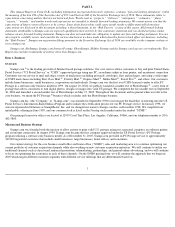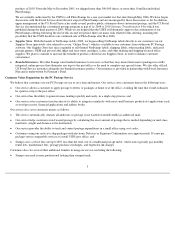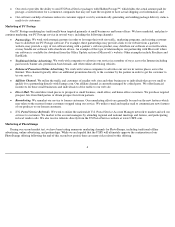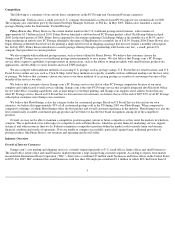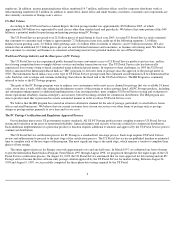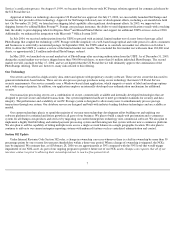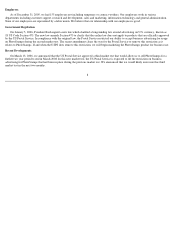Stamps.com 2005 Annual Report Download - page 14
Download and view the complete annual report
Please find page 14 of the 2005 Stamps.com annual report below. You can navigate through the pages in the report by either clicking on the pages listed below, or by using the keyword search tool below to find specific information within the annual report.
distractions could have a material adverse effect on our business, financial condition and results of operations. In addition, litigation in which
we are accused of infringement might cause product development delays, require us to develop non-
infringing technology or require us to enter
into royalty or license agreements, which might not be available on acceptable terms, or at all. If a successful claim of infringement were made
against us and we could not develop non-infringing technology or license the infringed or similar technology on a timely and cost-effective
basis, our business could be significantly harmed or fail. Any loss resulting from intellectual property litigation could severely limit our
operations, cause us to pay license fees, or prevent us from doing business.
A failure to protect our own intellectual property could harm our competitive position.
We rely on a combination of patent, trade secret, copyright and trademark laws and contractual restrictions, such as confidentiality
agreements and licenses, to establish and protect our rights in our products, services, know-how and information. We have 53 issued US
patents, 77 pending US patent applications, 12 international patents and 20 pending international patent applications.
We also have a number of
registered and unregistered trademarks. We plan to apply for more patents in the future. We may not receive patents for any of our patent
applications. Even if patents are issued to us, claims issued in these patents may not protect our technology. In addition, a court might hold any
of our patents, trademarks or service marks invalid or unenforceable. Even if our patents are upheld or are not challenged, third parties may
develop alternative technologies or products without infringing our patents. If our patents fail to protect our technology or our trademarks and
service marks are successfully challenged, our competitive position could be harmed. We also generally enter into confidentiality agreements
with our employees, consultants and other third parties to control and limit access and disclosure of our confidential information. These
contractual arrangements or other steps taken to protect our intellectual property may not prove to be sufficient to prevent misappropriation of
technology or deter independent third party development of similar technologies. Additionally, the laws of foreign countries may not protect
our services or intellectual property rights to the same extent as do the laws of the United States.
System and online security failures could harm our business and operating results.
Our services depend on the efficient and uninterrupted operation of our computer and communications hardware systems. In addition, we
must provide a high level of security for the transactions we execute. We rely on internally-developed and third-party technology to provide
secure transmission of postage and other confidential information. Any breach of these security measures would severely impact our business
and reputation and would likely result in the loss of customers. Furthermore, if we are unable to provide adequate security, the US Postal
Service could prohibit us from selling postage over the Internet.
Our systems and operations are vulnerable to damage or interruption from a number of sources, including fire, flood, power loss,
telecommunications failure, break-ins, earthquakes and similar events. Our Internet host provider does not guarantee that our Internet access
will be uninterrupted, error-free or secure. Our servers are also vulnerable to computer viruses, physical, electrical or electronic break-ins and
similar disruptions. We have experienced minor system interruptions in the past and may experience them again in the future. Any substantial
interruptions in the future could result in the loss of data and could completely impair our ability to generate revenues from our service. We do
not presently have a full disaster recovery plan in effect to cover the loss of facilities and equipment. In addition, we do not have a fail-
over site
that mirrors our infrastructure to allow us to operate from a second location. We have business interruption insurance; however, we cannot be
certain that our coverage will be sufficient to compensate us for losses that may occur as a result of business interruptions.
A significant barrier to electronic commerce and communications is the secure transmission of confidential information over public
networks. Anyone who is able to circumvent our security measures could misappropriate confidential information or cause interruptions in our
operations. We may be required to expend significant capital and other resources to protect against potential security breaches or to alleviate
problems caused by any breach. We rely on specialized technology from within our own infrastructure to provide the security necessary for
secure transmission of postage and other confidential information. Advances in computer capabilities, new discoveries in security technology,
or other events or developments may result in a compromise or breach of the algorithms we use to protect customer transaction data. Should
someone circumvent our security measures, our reputation, business, financial condition and results of operations could be seriously harmed.
Security breaches could also expose us to a risk of loss or litigation and possible liability for failing to secure confidential customer
information. As a result, we may be required to expend a significant amount of financial and other resources to protect against security
breaches or to alleviate any problems that they may cause.
11


